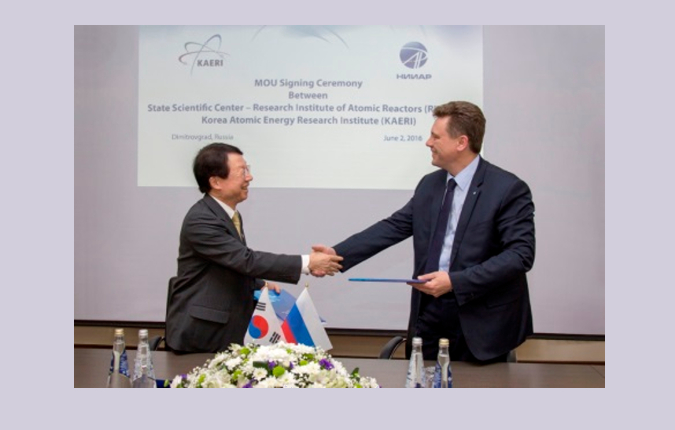|
|
Russia, South Korea Expand Collaboration in Nuclear Fission
8 June 2016
EIRNS—World Nuclear News (WNN) reported the signing of an agreement in Dimitrovgrad on June 3 between Russia’s Research Institute of Atomic Reactors (RIAR) and the Korea Atomic Energy Research Institute (KAERI). KAERI president Jong Kyung Kim said cooperation with RIAR would contribute to the development of expertise in: nuclear fuel, non-fuel components, and structural materials for advanced reactors; irradiation experiments and post-irradiation examination; operation and maintenance of fast neutron reactors, and in nuclear fuel cycle technologies, WNN reported in its website. KAERI currently commissions RIAR to carry out research according to several long-term contracts, the latest having been signed in October. That contract concerned research on experimental fuel rods irradiated in Russia’s BOR-60, which is the world’s only fast research reactor in operation. Commissioned in 1969, BOR-60 is fully contracted till the end of its lifetime in December 2020. Their joint work is part of Korea’s plans to develop a prototype Generation IV sodium-cooled fast research reactor. The 150 MW Korean research reactor is expected to start operations in 2028. RIAR will be the legal owner of the multipurpose sodium-cooled fast neutron research reactor, or MBIR by its Russian acronym, which is being built at its Dimitrovgrad site to replace BOR-60, WNN noted. Yet another indication of growing contact between these two nations is Yonhap news agency’s report today of South Korean Foreign Minister Yun Byung-se’s scheduled visit to Moscow next week, and his expected meeting with the Russian Foreign Minister Sergey Lavrov on June 13. The visit, the first by a South Korean foreign minister to Russia in five years, will focus on the North Korean nuclear program, Yonhap said. |


